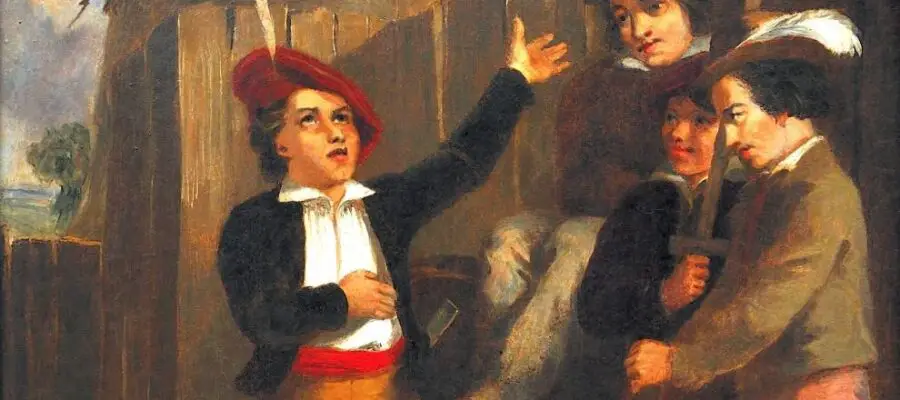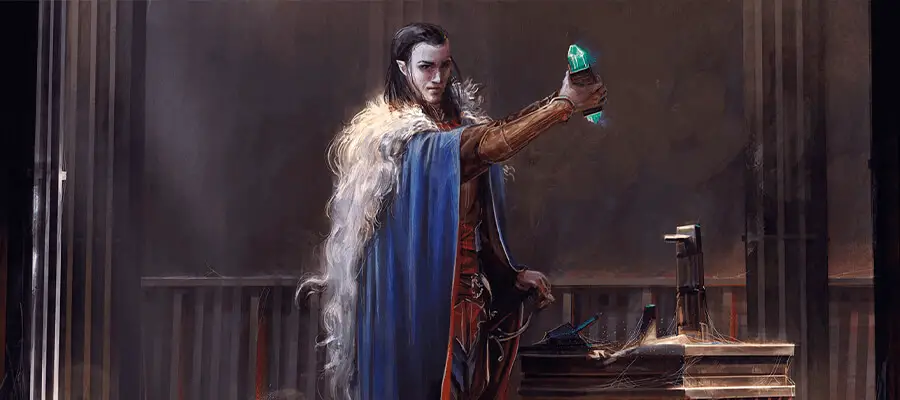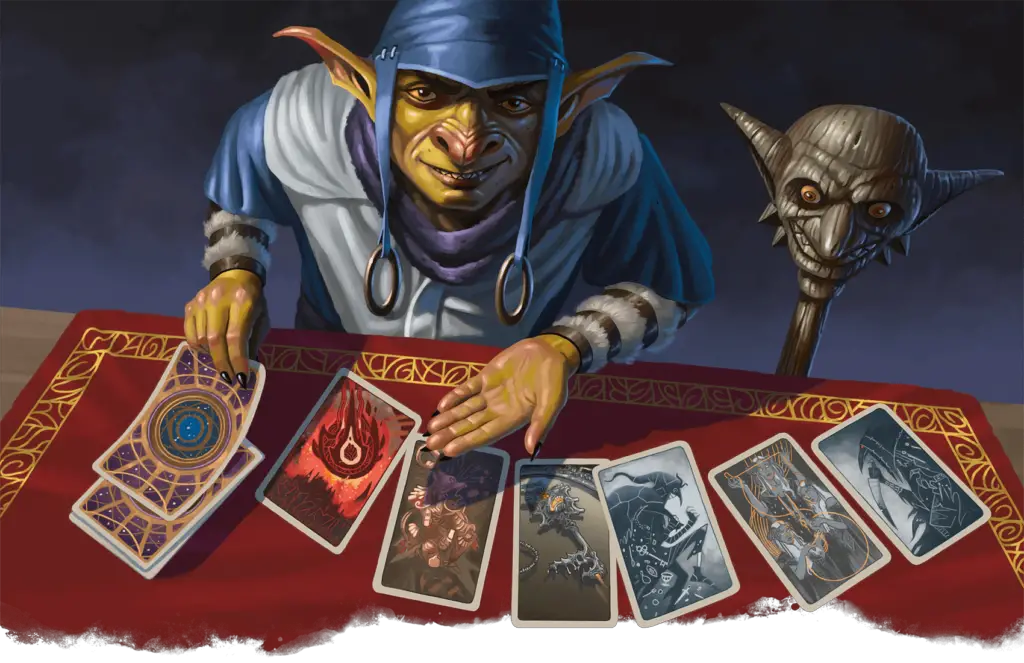Featured art “The storyteller” by William Collins. {{PD-US-unpublished}}.
This article contains affiliate links that add gold to our coffers.
D&D is teeming with opportunities for Dungeon Masters and players to pepper in poetic dialogue and writings. Matthew Mercer is one such DM whose use of vocabulary and eloquence consistently impresses me. It’s difficult for the average role player to improvise deep, beautiful, evocative verbiage in the middle of a game if they are not prepared to do so. Luckily, our world possesses an abundance of ancient and modern writings, records, and media whose poetic language you can swipe. I’ll be exploring the resources available to all of us in the real world that can aid in spicing up our dialogue, tenets, and creeds in our D&D and TTRPG sessions. You can become a teller of epic stories just like the professionals if you put the time and effort into it!
I’m merely a casual study of world cultures, religions, and poetry. I admit I’m not an expert in our world’s poetic writings. I am, however, a proficient DM and improviser; my experience has yielded practices that have enhanced my D&D games as both a DM and player. I’d guess that most of my readers are of a similar background as me, so I believe my research and experience will lend well to others like me. My advice primarily focuses on the DM, but players can learn from my tips as well.
With my premise out of the way, let’s explore our resources from the real world and how we can utilize them for our games! Aspiring storytellers read on to expound your skills!

Why Put Effort into Preparing Words?
Everyone loves a good zinger. You can be clever in a moment of personal excellence, but it helps to write down phrases that can apply to a variety of situations. I’m reminded of this scene from the Office where Daryl records a bit of dialogue that can be included in any situation for the editors to use, and it makes me laugh every time that the pay off comes later. Your job is something similar; find a phrase that is eloquent and makes you smile or grimace, then jump at the chance to take it from your notes to your words in the game. I currently strive to ‘farm words’ for my two Curse of Strahd campaigns because I want Strahd to have amazing dialogue. That guy needs to speak in zingers.
How to Prepare Eloquence
I have practical advice for preparing lines for D&D games (or any TTRPG). You’ll need to find a system that works for you, but I know a variety of methods for you to experiment with. It may be tempting to think that you’ve already tried something or assume a method won’t work for you. Don’t give up so easily on innovation! Consider how you can improve on a method that failed you in the past if you’re serious about improving.
Note Taking
This is straightforward for player characters because their players are only in charge of one character. Dungeon Master’s don’t have that luxury. An organized DM should consider taking dialogue notes based on character. Whether I decide on a quirky word, zippy sentence, or epic paragraph/speech, I note those pre-written quotes next to my notes on a character where I can see them regularly. Just because I have a quote written down doesn’t mean I’ll remember to use it in the moment, so it’s important to see the quote often in my notes until it’s the opportune moment to deploy it.
I’ve personally become accustomed to OneNote for my notes on the Curse of Strahd campaigns I’m running. It takes some getting used to, but I like the program’s flow and organization. I also use Google Docs and Google Sheets often, along with Microsoft Excel (which I love for its macros that allow me to roll a lot of dice hastily). Pen and paper note taking isn’t dead to me, though it’s definitely not what I use in 2020 when my games are played online.
The bottom line is that character notes can easily be annotated with a quick quote or two. This is already common for D&D 5e characters through their personality traits (remember those?) which are typically short statements packed with meaning. Characters prepared by Dungeon Masters and players alike would do well to include bonds and quotes for their characters in their notes and character sheets. Mechanical notes are often all I see on a character sheet, but it shouldn’t be that way! Add your character’s personality to your notes so anyone can pick up the character and play it true to concept.
Retroactive Quotes
I’ve occasionally had an awesome quote for my BBEG to say as he arrives on the scene or exits a dicey situation, only to realize after the session that I completely forgot to use the line. Not one to give up so easily, I have been known to send quotes to the group chat after a session so players can hear more from their favorite characters.
Don’t overdo it with the hindsight chat quotes. It can come across as you being unprepared in the moment, only to attempt to remedy your blunder afterward. Use retroactive details to sprinkle your weeks or months between games to keep your players engaged and to enhance the immersion and details of your game.
Rehearsal
Once you’ve found words for a character to use, say it out loud in that character’s voice three times minimum. Even improv comedians rehearse, so why shouldn’t you? Rehearse lines you want to get right, even if your practice is brief, will keep those words at the forefront of your mind so you know when to use them. You can do this in the car if you commute by yourself. Turn off the radio and speak words into the privacy of your automobile. You may find lines you thought were brilliant are actually mildly drab, but you might find yourself inventing new lines that are destined for glory.
Inspiration leaps from preparation, after all.
I was once in a production of A Midsummer Night’s Dream by William Shakespeare, playing the role of Bottom the Weaver. I still reflect on the happy memories of rehearsal when we’d be doing the same scene for the twentieth time when suddenly someone would have an idea for how someone could use movement or the punching of a particular word’s syllable. Such a minor change kept things fresh, but more importantly they allowed us to incrementally improve our scenes. Thus it should be with preparation of a D&D session. Take ten minutes before a session to run through key characters and some of their dialogue, and throw in an accent to see how you like it. I know rehearsal will pay off for you in ways small and grand.
I also recommend repetition. If there is an upcoming set piece that you want to describe perfectly, it’s worth your time to run through your description at least three times. You’ll find you can streamline your words as you cut the fluff and keep what’s most important.
Body Language
Your words are only as good as the way they are performed. Neglecting your posture and physical presence while telling a story is a big mistake. Even if you’re playing D&D online without a web cam, the other players will hear a difference in your voice based on how you’re physically postured. If you’re playing a confident blowhard who is constantly embellishing her achievements, stand up straight and keep your chin up. Portraying a character who is timid and afraid will be easier if you put your shoulders forward and keep your chin low.
For more on developing character voices to improve your eloquence through voice development, I have an article here on the topic.
Where to Dig for Golden Words
The vast variety of available can be daunting, so where do you begin? I’ve brainstormed ideas as well as explained sources I’ve used. The internet has given us unprecedented access to the greatest writers and orators of history, so let’s borrow from their expert eloquence.
dScryb.com
Opal and I were recently approached by dScryb about their affiliate program. They gave us access to their extensive collection of finely crafted box text, and I’ve been thoroughly impressed. I highly recommend checking them out if you’re a DM who wants to find expertly written descriptions of characters, places, spells, and more.
They’re constantly adding to their library, and they take requests from subscribers for what box text to write next. I’ve literally had players stop a game to compliment me on how well I described some of their spellcasting or the locations they were exploring. I told them it was because I was reading from dScryb box text word for word. Follow the link if you want to sign up so they know Flutes sent ya, and they’ll share some of that commission with Opal and me to say thank you. They’re a fledgling company that can use the love while they grow! They have a selection of free box text available so you can see what they’re capable of. I highly recommend reading the Charm Person spellcasting description or the Flesh Golem monster description.
Storytellers
Learn from the best! Storytelling festivals are probably not common in 2020 due to the challenges of social distancing, but the internet harbors an abundance of storytelling. I personally enjoy listening to other D&D and TTRPG sessions that are recorded on YouTube. These videos are long, so I tend to speed them up to 1.5x normal speed so I can get through more content. I’ve had to fish around for regularly occurring games that I enjoy listening to, but it has paid off for entertainment during my office job as well as for D&D storytelling skill development.
I personally recommend the Twice Bitten campaign if you want to learn about heavy roleplaying games from some of the best Curse of Strahd content I’ve encountered. They roleplay even heavier than Critical Role, which I also enjoy. Don’t just passively listen to storytellers you enjoy; take notes on words they use to describe concepts and places. Look up vocabulary words you’re less familiar with or that are completely alien to you.
Scripture and Theology
Clerics especially can benefit from a quick reference to holy scripture, but any character can find an interesting phrase by doing this. You might not find many zingers within scripture, but you will find interesting verbiage that hits that holy tone, making scripture perfect for creating bonds, oaths. These words will be valuable for holy, pious, disciplined, or otherwise aligned with a cause. Our world possesses a multitude of holy books to glean from, including but not limited to the following:
- The New Testament (Bible)
- The Old Testament (Bible)
- The Apocrypha
- The Torah
- The Quran
- The Vedas
- Tripitaka or Pali Canon
- Tibetan Book of the Dead
- Memorial Verses on the Middle Way
- Great Stages of Enlightenment
I Googled “Bible insults” to see if I could find interesting insults or responses to insults that could be used by a Paladin or Cleric. I was not disappointed. Here are several that I found useful:
“Whom have you taunted and hurled insults at? At whom have you shouted, and looked so arrogantly? At the Holy One of Israel!” (translation: when you insult me you insult my god)
“Listen, our God, for we are despised. Make their insults return on their own heads and let them be taken as plunder to a land of captivity.” (translation: God, please make these fools regret their insults)
“I have heard a rebuke that insults me, and my understanding makes me reply.”
These are excellent quotes to throw down if you’re playing a character with a holy quest to fulfill! I’m going to add these to my notes so I don’t forget them…
There are resources available on the internet that can provide digital versions of holy books, allowing you to search (CTRL+F) for particular words you’re interested in. You may discover resources with compilations and references for where a holy book speaks on topics of interest.
If old translations aren’t your thing, find a modern translation or turn to contemporary theology. Theologians have provided modern commentary of a religious nature for anyone who doesn’t care to interpret constantly retranslated text from the old world. Portraying a character who muses about religion, ethics, and the gods can be as easy as dabbling in theology writings.
Poetry and Classic Quotations
Bards should browse poetic writings to harvest interesting phrases to express themselves. Shakespeare is an excellent source of eloquent speech and esoteric phrases that will make your fellow players giggle. I’ve found that libraries often have books from the 1970’s and prior that hold entire collections of a poet’s works. There are also books that contain short quotes and anecdotes on various topics like love, war, hunger, and foolishness. When I was a younger man, I enjoyed reading through books of quotes while I was between class periods in school, taking note of any that I particularly liked. I still remember some of those quotes.
Poetry isn’t something that is easy to construct in a moment. You don’t need an entire poem either (some are quite long). If your group loves to roleplay for most of your sessions, and they won’t mind you spending several minutes reciting a poem you wrote down that would relate to how your character feels, go for it; otherwise, maybe stick to excerpts of poems you enjoy. Brevity is the soul of wit, so you shouldn’t worry that being brief will seem half baked or anything like that.
Cinema
This is more than being that guy who can’t help but quote movies all the time in conversation (though quotes are great). Movies are rich with moving music and timeless themes.
You may not be capable of narrowing your movie tastes down to a single ‘favorite movie’, but I’m sure you have a list of movies that have meant a lot to you. These are the movies that shaped your worldview, made you cry, or inspired you. When you’re preparing for a D&D game, and this goes for players too, think of what kind of themes are below the surface of the game’s narrative. Once you’ve identified one or two themes, research movies you like that have similar or common themes. You’ll discover ways that those movies used a variety of methods to develop the themes they were built around.
Dialogue has a massive influence on a film’s theme, so I highly recommend researching popular quotes from a given movie. Gattaca is a move I enjoy very much, so I occasionally read through its quotes to relive some of the movie’s moments. Here are a few that I could use in a D&D game:
“He had everything except desire.”
“There’s no gene for fate.”
“I was never more certain of how far away I was from my goal than when I was standing right beside it.”
“I got the better end of the deal. I only lent you my body – you lent me your dream.”
“The only time you’re going to see the inside of a space shuttle is if you’re cleaning it.”
What marvelous quotes these are! As you read them, do you imagine scenarios that you could use these words in D&D? I certainly do. I do not use space shuttles in my D&D campaigns, but I could substitute that concept for a royal palace or a handsome person’s bedchamber. Quotes are full of inspiration if you’re seeking it.
History and Pop Culture
The earth’s historical records have no shortage of quotations. Picture the character you’re planning for, then research a historical figure that may resemble the character. You’re bound to find insights into how your character may behave, and certainly on thoughts they may express through the spoken or written word.
As an example, I’ll try this right now. I want to find a quote that suits a Barbarian with swelling muscles and impressive hair. When I consider this type of aesthetic, I think of Fabio Lanzoni, Arnold Schwarzenegger, and Carl Weathers. Let’s find quotes by Fabio! Here are a few:
“I try to limit myself to one hour of sun each day.”
“You have to be a low-class scumbag to start calling a woman a name. If you’re a man, you should never. You should be a gentleman.”
“Your mind is very powerful, and your soul knows what’s best for you. So the more in contact you are with your soul, the more you know your path.”
“Life is a long marathon, and you have to be consistent. Anyone can spring for 1,500 meters, but you have to pace yourself through your entire life.”
“Always invest your money in the best food out there, and it’s going to pay off in the long run.”
These quotes are excellent for adding flavor, depth, and personality to a fictional character for a TTRPG! I can already picture how I might twist some of these quotes slightly to focus on different flaws and bonds. All I had to do was search the internet for quotes attributed to the historical (or pop culture) icon that I had in mind, and I found heaps of inspiration!
You may also choose a reputable physician, leader, or other person who may be known for great intelligence, wisdom, or charisma. The famous psychologist Carl Jung is one of my favorites for quote farming:
“Who looks outside, dreams; Who looks inside, awakes.”
“Knowing your own darkness is the best method for dealing with the darknesses of other people.”
“Everything that irritates us about others can lead us to an understanding of ourselves.”
Conclusion
You don’t need to be a brilliant writer or orator to enrich your D&D games with polished eloquence. Put in the preparation and know your resources so you can enhance the way you play. Begin today to find inspiration from the vast amount of knowledge available on the internet and in literature. You’ll find yourself feeling smarter, and your characters will come to life.
Which of my tips do you already enjoy using? Did any of my methods sound worth a try to you? I’d love to hear your thoughts, especially if you can report on what works for you. Cast Message in the comments below so we can chat about how we prepare words for D&D.
Don’t forget to check out our other articles about tips for Dungeon Masters and for players before you go! Thank you for reading.




